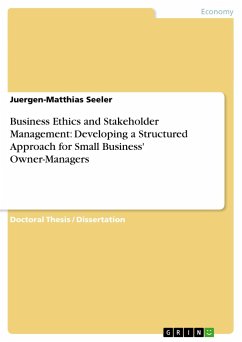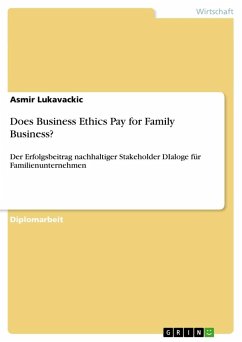Doctoral Thesis / Dissertation from the year 2011 in the subject Business economics - Business Management, Corporate Governance, grade: Excellent, , language: English, abstract: Business ethics is a matter of increasing importance and public awareness. Recent scandals and the financial crisis have suggested that the standard of business ethics is not high and that corporate behaviour should not solely be oriented to profit goals. Rather, a firm's ethical conduct should be part of its focus. While discussions of ethical questions in a market economy are mainly related to large firms, this thesis specifically aims at revealing potential problem issues and solutions for small firms. These firms are often ignored when moral concerns in business are addressed. This is in contrast to their importance for the economy and society of almost every country of the OECD, as they constitute the majority of all companies, and provide a major share of jobs.The majority of the studies examining business ethics are focused on large corporations, using quantitative strategies. Few studies related to small business have been undertaken. The question of how these firms and their owner-managers could systematically engage in business ethics and ethical stakeholder management remain unanswered. The thesis develops a tool which explicitly addresses this topic: the Ethics Integration Guideline. On the basis of a research paradigm of constructivism, a study was designed which was intended to elicit, and then to guide, small business owner-managers' ethical attitudes, perceptions and experiences. It aimed to develop a structured guideline which can help small firm owners to integrate ethical considerations into their business activities. Taking owner-managers' perspectives into account provides insight into the small firms' context. Thus, practical applicability of the guideline is provided.The results of the research suggested the framework for an Ethics Integration Guideline comprised of sets of questions and imperatives derived from the interview statements during the research. It turns out that the guideline differs considerably from approaches applied in large firms. The Ethics Integration Guideline developed in this research provides a unique tool which connects research results with user's individual perspectives and experiences in his firm. The guideline is flexible, applicable and adaptable to the needs of the firm in question. It bridges the gap between ethics theory and business conduct. Thus, it contributes to professional practice in small firms - a sector which is commonly underestimated in its importance to the welfare of a society.








